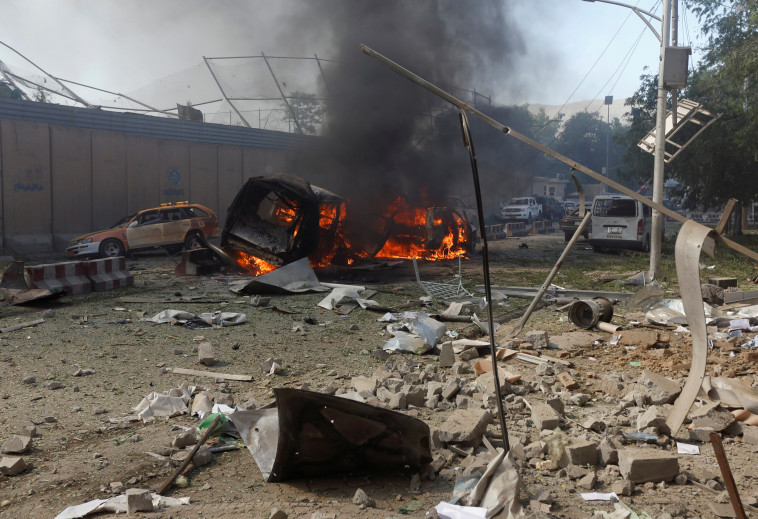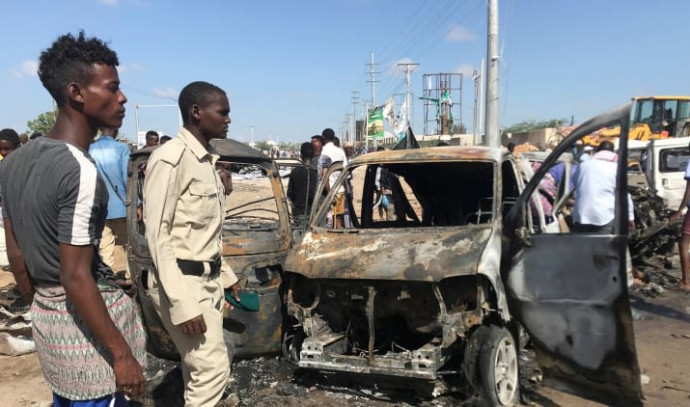The year 2020 is expected to be remembered as one of the hardest and worst years the world has known in recent times. With the start of 2021 we are all looking forward to a better year, which will bring with it much better news than those we are used to hearing during the year that has just ended. At the same time, it is possible that for at least one reason 2020 is expected to be considered and remembered as a year in an important row in the Middle East in particular, and in the world in general. Against the background of the long-standing global fight against terrorism, one of the clearest practices of various terrorist organizations is suicide bombings – the year 2020 knew very little of them relative to the last decade, which was bloody.
The annual report reviewing the suicide bombings around the world on behalf of the Low Intensity Terrorism and War Research Program led by Yoram Schweitzer, Aviad Mandelbaum and Erella Handler-Blum The Institute for National Security Studies in Tel Aviv (due diligence: HM has taken part in this program in the past), published today (Tuesday), shows that 2020 can indeed be an important turning point in the matter. At the end of a decade saturated with violence and blood, during which hundreds of such attacks were carried out on average every year, in the last year only 127 attacks were carried out. Just to clear the ear, in the peak years of the Islamic State (2014-2016) more than 500 suicide bombings were carried out on average all over the world.
Along with the natural tendency to attribute the decline in the number of suicide bombings to the Corona plague alone, it should be emphasized that overall this is a direct and gradual continuation of a similar process that also took place in 2018 and 2019. Most of the suicide bombings have been concentrated in three main countries: Afghanistan, Somalia and Syria. In addition, there was a sharp decline in the number of casualties.
Terrorist attack in Sri Lanka, archive
127 suicide bombings (149 in 2019 – a decrease of about 14.5%) were carried out by 177 suicide bombers (compared to 236 in the previous year, a decrease of about 25%). There was also a sharp decrease in the number of casualties: 765 deaths (compared with 1,855 last year, a decrease of about 58.5%) and 1,925 people were injured (compared with 3,663 last year, a decrease of about 47.5%). In addition, there was a decrease this year in the number of countries affected by suicide terrorism – 17 compared to 24 in 2019.
The most active arena for the third year in a row is Afghanistan (most of the Taliban attacks have been carried out this year since September – following the beginning of talks between the Afghan government and the Taliban, as part of the Taliban-US understandings to withdraw US forces) – 57 suicide bombings. % Of all suicide bombings counted worldwide In Africa, 37 attacks were carried out this year (about 29% of all attacks), most of them in Somalia. In the Middle East, which for a decade and a half, until recent years, was the most prominent suicide scene, 33 attacks (about 26%). Of all the attacks) when 19 of them were in Syria.In addition, the number of suicide bombings carried out by ISIS and its allies continued. Nevertheless, even this year, the Salafist jihadist organizations remain responsible – directly and indirectly – for about 95% of all suicide bombings in the world.
As mentioned, not only the number of attacks decreased, but also the number of casualties. In the past year, an average of six people were killed in each attack, compared to an average of 12 last year. In addition, in the past year, an average of 15 people were injured in each attack, compared to an average of 25 injured in the previous year. This figure is certainly unusual compared to previous years, and is related, among other things, to the raging epidemic. While most of the world has been fighting in Corona, banning gatherings, the devastating effect of suicide bombings targeting crowded concentrations of people has been substantially hurt.
In the Middle East, there has been a significant decrease in the number of suicide bombings, and perhaps there is a need to learn about a certain degree of stabilization. At the same time, while the number of suicide bombings in the area is significantly small, fighting in many areas has remained difficult and violent. In general, the sharp decline in suicide bombings in the region is most closely linked to the decline in ISIS power. A total of 19 attacks were carried out in Syria, eight in Iraq, and in addition, attacks were carried out in Egypt, Yemen, Lebanon, Libya and Turkey. Along with ISIS, which is still behind most of the attacks in the region, we can also mention the terrorist organization Hayat Tahrir al-Sham, which is fighting in Syria.
Along with Afghanistan and the rest of the Middle East, Africa also continues to be an active terrorist arena in the suicide field. In 2020, 37 terrorist attacks were carried out, accounting for about 29% of all suicide bombings in the world by the two prominent organizations – al-Shabab the Somali, a partner in al-Qaeda, and Boko Haram (active mainly in Nigeria and its environs), a partner in ISIS. In contrast to the overall declining trend in suicide bombings around the world, in Africa stability has been maintained and there has even been a small increase in the number of attacks, about 37 attacks compared to about 33 in the previous year (an increase of about 12 percent). Along with Somalia and Nigeria, attacks have also been carried out in Cameroon, Chad, Algeria and Mali.
 Terrorist attack in Kabul, Afghanistan (Photo: Reuters)
Terrorist attack in Kabul, Afghanistan (Photo: Reuters)Women have also taken part in suicide bombings in the past year, but their relative share of all suicide bombings, about 7.5 percent, is declining. The nine attacks in which women took part were carried out in five countries, involving a total of 13 women. These attacks killed 57 people and injured 134. This year there was a 41 percent drop in the number of women committing suicide after in 2019 22 women took part in 14 terrorist attacks. Also in 2020, as in previous years, most of the suicides were sent by Boko Haram.
Yoram Schweizer“The report does not tell the whole story – the corona is not necessarily responsible for the decrease in the number of attacks and the number of casualties. It is certainly possible that this has led to a decrease in the motivation to carry out attacks in the West, where people are,” the head of the low-intensity terrorism and war program. In the closure, however, in African, Asian and Middle Eastern countries the decline can also be explained by a variety of other circumstances such as the countries’ ability to thwart the attacks, interests of the organizations themselves (the Taliban in Afghanistan for example sought to carry out attacks against the government but did not want to anger the public). And more. ”
Schweizer explains the decline in the number of suicide bombings, mainly due to the decline in ISIS power in recent years: “In 1981, the first attack on the Iraqi embassy in Syria took place. In 1982, we saw Hezbollah’s attack on the General Administration building and from there it all began. 200-150 suicide bombings worldwide, in the next decade there were about 2,500 suicide bombings – mainly against the backdrop of the American war in Iraq and Afghanistan, and in the last decade we have seen over 3,000 suicide bombings – with the main mass of the decade being in the heyday of ISIS. “Jihadists have found it to be a particularly effective weapon, including in the battlefields themselves. In the last two years, we have seen a significant drop in numbers in line with a drop in their power.” He added: “It is possible that without the agreement signed between the Afghan government and the Taliban, mediated by the United States, we would have witnessed an exceptional year in the absence of its attacks.”
And what about Israel?
“The last suicide bombing in Israel was in Jerusalem in 2016. Along with a variety of internal reasons, the Israeli security forces’ ability to thwart terrorist attacks is among the highest. It is worth looking at the annual reports of GSS leaders – whether at the Foreign Affairs and Defense Committee or at the Prime Minister’s Awards Ceremony. For example, at the end of 2019, Shin Bet chief Nadav Argaman said that a total of 560 terrorist attacks had been thwarted, of which about ten were suicide bombings. We understand from this that the will exists and there are those who will be willing to carry it out if it is decided that it is necessary. It is a matter of organizational decision, of cost-benefit considerations, alongside image and circumstances. “In recent years, this has not happened and there is also a decrease in intentions, but it is not a tool that can not return.”
also Erella Handler-Bloom She told Maariv: There has been a jump in the number of suicide bombings in Afghanistan since September, when talks between the Taliban and the Afghan government began. At the same time we see a decrease in the number of casualties per attack without many casualties. The reason is that they mainly harm security and government targets, which among other things have a higher level of protection. The increase in terrorist attacks stems from the Taliban’s desire to advance the settlement with the government, But they do not want to hurt the citizens too much, so that they do not turn against them. “In addition, the Taliban does not take responsibility for many of its attacks – for the same reasons that it wants the talks to succeed and not stop.”
It can be estimated that in the next decade it will become clear whether the declining trend that has characterized suicide bombings in recent years stems from reaping the benefits of this pattern of action for the organizations that use it, or whether it is a result of the circumstances in which they thrive. However, it is estimated that due to the symbolic-value importance of suicide bombings (Estehad – self-sacrifice in the way of God) for Salafi-Jihadi organizations, even beyond their instrumental advantage, suicide terrorism will continue to be a tool in their struggle – albeit in varying degrees, frequency and intensity. , Also in the coming years.
